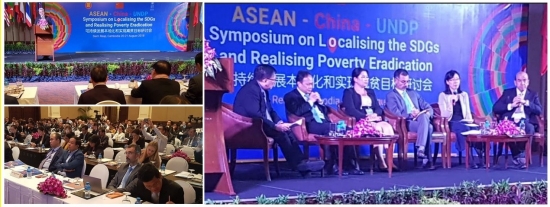21 Aug 2018

ASEAN, partners call for robust implementation of SDGs by local governments
Source: ASEAN Secretariat News
SIEM REAP, 21 AUGUST 2018 – ASEAN, together with its dialogue partner China and the UNDP called on local governments of the region to take a more active role in poverty alleviation programmes as espoused by the sustainable development goals (SDGs) agenda. The call was made at a symposium held today in Siem Reap, Cambodia.
At the opening of the ASEAN-China-UNDP Symposium on Localising the SDGs and Realising Poverty Eradication, ASEAN’s Deputy Secretary-General for Socio-cultural Community Vongthep Arthakaivalvatee highlighted ASEAN’s efforts in building the ASEAN Community that is rules-based, people-oriented and people-centred. He noted the progress and achievements ASEAN has made in promoting complementarities between ASEAN’s Vision 2025 and the SDGs. He said “ASEAN Vision 2025 and SDG converge. The desire of the peoples of ASEAN to live in a peaceful, harmonious, inclusive, resilient, and healthy community meets the strong leadership and commitment of the ASEAN Leaders. Let us all leverage on the complementarities between these two important agendas for the betterment of the peoples of ASEAN.”
Based on latest data from ASEANStats, economic progress in ASEAN in the last 50 years has significantly reduced poverty across the region. The proportion of ASEAN population living with less than USD1.25 PPP per day fell from a high of 47% in 1990 to 14% in 2015. The SDG goal to “leave no one behind” means ASEAN still has some work to do.
Meanwhile, the Chinese Ambassador to ASEAN Huang Xilian reiterated his government’s support to synergizing the implementation of the UN Agenda 2030 in his remarks. He said “China is ready to strengthen cooperation with the UN and ASEAN to foster sustainable development as a new growth point of China-ASEAN cooperation and enhance intensive cooperation in clean energy, poverty eradication, environmental protection and climate change.” Amb. Xilian emphasized that sustainable development and poverty eradication would be impossible without the support of all sectors.
“The ASEAN region has seen remarkable economic progress, yet persistent development challenges remain. Growing inequality, increasing employment insecurity, environmental degradation and increasing disaster risks could undermine the gains that have been made and push more people into poverty,” said Mr. Haoliang Xu, UN Assistant Secretary-General and UNDP Regional Director for Asia and the Pacific, in his keynote address. “The Agenda 2030 is clear that tackling complex development challenges requires collaboration and sustained efforts from all stakeholders. We must join forces to ensure that we consolidate our efforts in innovative and transformative ways, take solutions to scale, and equip especially local governments and community actors to become agents of change.”
In his keynote address, Mr. Sao Chivoan, Secretary of State, Ministry of Rural Development of Cambodia expressed a similar sentiment. Chivoan said that “the objectives of ASEAN Vision 2025 and those of the SDGs converge and complement. Both aim to uplift the standards of living of our peoples.” Further, he expressed appreciation for the support and engagement of partners in promoting complementarities between the ASEAN Vision 2025 and the SDGs.
He said that the Cambodian government stands “ready to support the establishment of a Regional Initiative to Localization of the SDGs in ASEAN.”
Government officials in charge of implementing the SDGs in ten ASEAN Member States, experts, international organisations, development partners, non-governmental organisations/civil society organisations, and private sectors attended the symposium. These actors are considered to have the most significant role in translating and achieving specific goals at the local level, particularly in the context of socially and economically diverse ASEAN Member States.
The ASEAN Vision 2025 has for its main goal the realization of a rules-based, people-oriented and people centred ASEAN Community where its peoples enjoy higher quality of life and the benefits of community building. Accordingly, the development of Vision 2025 was informed by ASEAN’s own development context and compliments the United Nations 2030 Agenda for Sustainable Development. DSG Vongthep affirmed that “the complementarities between ASEAN Vision 2025 and SDGs will further unlock the potentials of ASEAN in achieving the sustainable development agenda and contribute to ASEAN regional integration and development.”
# # #